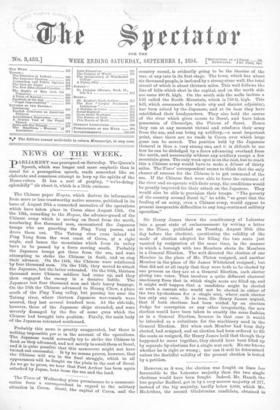'The Times of Wednesday gives prominence to a communi- cation
from a correspondent in regard to the military situation in Corea. Seoul, the capital of Corea, and the country round, is evidently going to be the theatre of the war, at any rate in its first stage. The town, which has about six thousand people, is inclosed by a strong stone wall, the total circuit of which is about thirteen miles. This wall follows the line of hills which shut in the capital, and on the north side are some 400 ft. high. On the south side the walls inclose a 2 hill called the South Mountain, which is 750 ft. high. This hill, which commands the whole city and district adjoining, has been seized by the Japanese, and at its base they have established their headquarters. They also hold the course of the river which gives access to Seoul, and have taken possession of Chemulpo, the Pincus of Seoul. Hence they can at any moment victual and reinforce their army from the sea, and can bring up artillery,—a most important point, since there are no roads in Corea over which large guns can be moved. The position held by the Japanese General is thus a very strong one, and it is difficult to see how he can be dislodged by a force advancing overland from the north, and necessarily without any artillery except a few mountain-guns. The only weak spot is on the east, but to reach this a Chinese army would have to make a detour of thirty miles. The Times' correspondent seems to think that the only chance of success for the Chinese is to get command of the sea. If the Chinese fleet were able to force the entrance of the river and co-operate with their army, the conditions would be greatly improved for their attack on the Japanese. They would also be able to provision their troops. " The poverty of the country around Seoul is," he adds, " so great that the feeding of an army, even a Chinese army, would appear to present insuperable difficulties to any long-continued military operation."


































